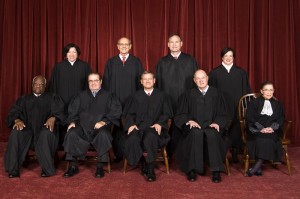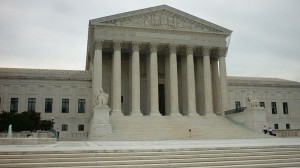 As the year comes to a close, many like to reflect on the significant stories that shaped the past twelve months. A number of major events affected Christians throughout 2013, from the overturning of key parts of the Defense of Marriage Act (DOMA) and its impact on the nation, to the escalating number of businesses being forced to check their faith at the door both in regard to facilitating homosexual ‘marriage’ and paying for abortifacient drugs, to continued and increasing atheist attempts to eradicate God from the public arena.
As the year comes to a close, many like to reflect on the significant stories that shaped the past twelve months. A number of major events affected Christians throughout 2013, from the overturning of key parts of the Defense of Marriage Act (DOMA) and its impact on the nation, to the escalating number of businesses being forced to check their faith at the door both in regard to facilitating homosexual ‘marriage’ and paying for abortifacient drugs, to continued and increasing atheist attempts to eradicate God from the public arena.
The Overturning of DOMA, the Spread Through the States and the Silencing of Dissent

As the new year began, many were aware that 2013 would be a significant year surrounding the issue of homosexual “marriage.” Officials in the state of Maryland rang in the new year by hosting same-sex ceremonies at the stroke of midnight, and Barack Obama called for the reconstruction of society for “our gay brothers and sisters” during his inaugural speech that month.
Controversy had already broken out before the inauguration as homosexual activists decried the invitation of Pastor Louie Giglio of the popular Passion Conferences to present the benediction as an old Giglio sermon had surfaced regarding the sin of homosexuality. Giglio soon backed out of the invite, stating that his ministry team did not want to “be in a fight on an issue not of our choosing,” and that “speaking on this issue has not been in the range of my priorities in the past fifteen years.”
The following month, the Pentagon announced that it was extending federal benefits to members of the military that identified as homosexual, and in May, the House issued its first-ever spousal ID to the partner of a homosexual Congressman.
During the same month, Rhode Island, Delaware and Minnesota all legalized homosexual “marriage,” and the Boy Scouts of America announced that it had voted to lift its ban on openly homosexual members.
In late June, the United States Supreme Court struck down key parts of the Defense of Marriage Act (DOMA), which was praised by homosexual activists and denounced by Christian leaders nationwide. Following the ruling, the ACLU and other groups filed lawsuits challenging marriage laws in Kentucky, Pennsylvania, Texas and other states, citing the Supreme Court decision. A number of courts began utilizing the ruling to assert that the states must follow the lead of the federal court.
Legislatures across the country also passed homosexual “marriage” bills this year, including in Hawaii and Illinois, and judges in New Jersey, Utah and New Mexico struck down the state marriage laws as unconstitutional.
In addition to Louie Giglio, a number of other prominent Christian figures also came under fire in 2013 for disagreeing with the homosexual lifestyle, including ESPN commentator Chris Broussard, evangelist Greg Laurie, Gospel singer Donnie McClurkin, FOX Sports Southwest commentator Craig James, and Phil Robertson, patriarch of the famed Duck Dynasty reality television show. McClurkin, a former homosexual, was disinvited from a civil rights concert for his beliefs about homosexuality, James was fired from his job days after coming on board and Robertson was placed on suspension but later reinstated.
Businesses Battle Right to Biblical Beliefs

In light of the insurgence of the homosexual agenda, a number of businesses across the nation and around the world fought battles in the courts this year to retain their rights not to participate in same-sex “weddings.” While all of the business owners stated that they had no problem serving homosexuals, they advised that they could not personally and actively facilitate same-sex ceremonies due to their convictions not to partake in other men’s sins. However, anti-discrimination laws in a number of states were used to cite Christians and force them to compromise under the law.
Sensing trouble on the horizon, one tourist agency in Maryland stopped offering wedding services altogether with the new year in order to avoid a lawsuit. Months later, a Hawaiian court ordered a Christian bed and breakfast to facilitate homosexuals after it would not allow two lesbians to sleep together. In July, a UK bed and breakfast was charged with discrimination, and a second venue was likewise charged and found guilty for not allowing homosexuals to share a bed.
A Christian florist in Washington was leveled with two lawsuits after she declined to provide flowers for a same-sex “wedding,” and two bakeries—one in Colorado and another in Oregon—faced formal complaints after they turned down homosexuals who were seeking cakes for their ceremony. The baker in Oregon closed his doors and moved his bakery to his home following what he described as “mafia tactics” by homosexuals to put them out of business. The baker in Colorado was ordered this month to bake the cakes or face fines.
A Christian photographer in New Mexico also appealed her case to the United States Supreme Court this year after she was likewise ordered to shoot same-sex ceremonies or face fines. The state Supreme Court had ruled in August that the photographer and her husband “may pray to the God of their choice and follow those commandments in their personal lives wherever they lead,” but that they must make “compromises” in their business.
One wedding venue in Iowa filed a counter-suit in October after they were leveled with a complaint for declining to offer their facility for a same-sex “wedding.” The couple, who are Mennonite, are asking the courts to protect their rights to religious freedom.
Obey God or Obama?

The 2013 enactment of the Affordable Care Act and the enforcement of what has become known as the Obamacare abortion pill mandate resulted in a number of lawsuits from Christian colleges, non-profit organizations and businesses throughout the year.
The most significant battle of the year was the filed by the arts and crafts chain Hobby Lobby, which eventually was granted a temporary injunction against covering the morning-after and week-after pill following a series of concerning blows. The ruling assisted other business owners who also applied for an injunction, including Randy Reed Automotive in Missouri, Cherry Creek Mortgage company in Colorado, and Korte & Luitjohan Contractors and Grote Industries, located in Illinois and Indiana, respectively.
Others who received injunctions prior to the Hobby Lobby ruling included Domino’s Farms Corporation, led by the founder of Domino’s Pizza, and the Bible manufacturer Tyndale House Publishers.
However, Conestoga Wood Specialties Corporation, which has locations in Arkansas, Maryland, Utah, North Carolina and Pennsylvania was denied an injunction and filed an appeal with the U.S. Supreme Court. Eighteen states signed on to a brief in support of the company, which believes that terminating a life after conception is “is an intrinsic evil and a sin against God.”
A number of Christian universities filed requests for an injunction this year and won, including Biola University and Grace Seminary, East Texas Baptist University, Houston Baptist University and Westminster Theological Seminary. Southern Nazarene University, Oklahoma Wesleyan University, Oklahoma Baptist University and Mid-America Christian University also challenged the requirement, explaining that when it comes to God vs. Obama, they must obey God.
“We are filing suit because we believe God is God, not the government,” stated Oklahoma Wesleyan University, “and that ‘we must obey God rather than men.’”
However, because the Obama administration filed an appeal of the injunction granted to Hobby Lobby, asserting that secular businesses are not entitled to religious exemptions, the case is now in the hands of the United States Supreme Court, who will rule on the matter next year. Like the DOMA ruling, the Hobby Lobby case could have national impact in regard to the conscience rights of employers.
Burgeoning Battles

In addition to deciding whether businesses must compromise their faith to obey Obama, the Supreme Court is set to rule next year whether town hall prayers may legally be predominantly in Jesus’ name. Town of Greece v. Galloway was accepted by the court this November after the Second Circuit Court of Appeals took issue with the invocations, which they noted “virtually ensured a Christian viewpoint.”
Numerous localized cases were also fought throughout the year as several atheist groups threatened municipalities across the nation to cease presenting prayers during city hall meetings, and dozens of other letters of complaint were issued regarding public displays of Christianity. The Freedom From Religion Foundation (FFRF) sent letters to officials in Cape Coral, Florida and League City, Texas to urge a discontinuation of its practice of prayer, and wrote to officials in Alamogordo, New Mexico over the posting of the motto “In God We Trust.”
The group also filed suit over what it believes is the preferential treatment of churches by the IRS, and took issue with a public school curriculum in Springboro, Ohio, which spoke of the nation’s Judeo-Christian heritage.
The United States Army was threatened with a lawsuit by the Military Religious Freedom Foundation this past February after a chaplain delivered a distinctly Christian prayer, and the group also succeeded in having removed a painting at an Idaho Air Force base that cited the Scripture “Blessed are the peacemakers.” An article referencing the phrase “There are no atheists in foxholes,” written by a Christian chaplain in Alaska, was additionally removed for a time following a complaint from the group, but was later restored.
Those That Refused to Bend

However, Christians succeeded in a number of legal battles, including in Lakeland, Florida, where a federal judge upheld prayers at the city’s council meetings a being constitutional, and the Sixth Circuit Court of Appeals likewise ruled invocations in Hamilton County, Tennessee as being permissible under the law.
In Pheonix, Arizona, an appeals court tossed a lawsuit challenging Governor Jan Brewer’s Day of Prayer proclamations, and an atheist lost a fight against officials in Cross City, Florida who sought to have a Ten Commandments monument removed from the county courthouse. Likewise, a federal judge in New York City threw out an American Atheists lawsuit in March that challenged a World Trade Center cross-shaped beam displayed at the Manhattan 9/11 museum, and prominent atheist Michael Newdow lost his suit seeking to have “In God We Trust” removed from American currency.
A number of challenges from atheist and church-state separation groups caused Christians to unite this year, such as when record crowds turned out for a “prayer caravan” in Cullman, Alabama this past August after FFRF had pressured local officials to cancel the event. In May, thousands attended an “In God We Trust” musical in Lindale, Texas to combat atheist attempts to foil the program.
A student in Stanford, Kentucky received a standing ovation the same month as he defied attempts to stop graduation prayer by presenting an invocation anyway. The following month, a valedictorian in Pickens County, South Carolina ripped up his graduation speech and presented the Lord’s Prayer in defiance of the school district’s decision to no longer include prayer at graduation ceremonies.
Other notable stories included a Wisconsin county’s unanimous vote to continue prayer during its board meetings despite threats from atheists, and similar resolutions in Rapid City, South Dakota and in Greenville, Pennsylvania.
What’s Next?
While one cannot predict the future, 2013 is likely is an indication of the battles that will rage—and become more frequent—in the new year. We at Christian News Network will continue to bring you the news from a Biblical perspective so that you might be aware of the issues we face in these modern times.
Become a Christian News Network Supporter...


